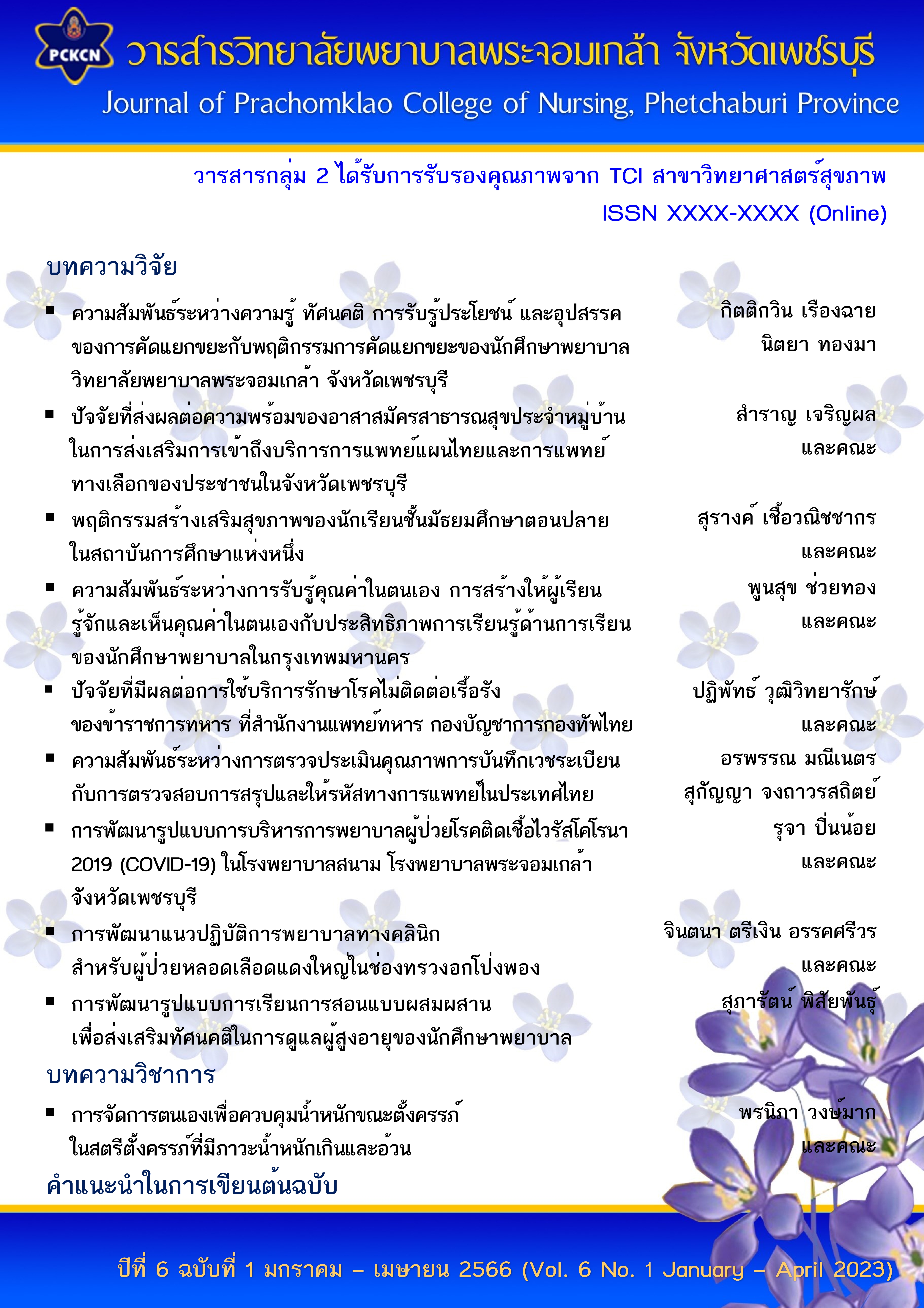การจัดการตนเองเพื่อควบคุมน้ำหนักขณะตั้งครรภ์ในสตรีที่มีภาวะน้ำหนักเกินและอ้วน
Main Article Content
บทคัดย่อ
สตรีตั้งครรภ์มีภาวะน้ำหนักเกินและอ้วนเป็นผลจากความไม่สมดุลของพลังงานที่ร่างกายได้รับจากการรับประทานอาหาร และพลังงานที่ร่างกายนำไปใช้ ส่งผลให้ร่างกายมีการสะสมไขมันที่มากกว่าปกติ เพิ่มความเสี่ยงต่อการเกิดภาวะแทรกซ้อนต่าง ๆ ได้ ซึ่งผลกระทบที่เกิดขึ้นอาจส่งผลให้มารดาและทารกเสียชีวิตได้
บทความนี้อธิบายเกี่ยวกับ การมีภาวะน้ำหนักเกินและอ้วนก่อนการตั้งครรภ์ การเปลี่ยนแปลงทางสรีรวิทยา เพื่อให้เข้าใจเกี่ยวกับความเสี่ยงและผลกระทบที่เกิดขึ้น เป้าหมายหลักในการดูแล คือ เพื่อลดความเสี่ยงการเกิดภาวะแทรกซ้อนกับสตรีตั้งครรภ์และทารกในครรภ์ โดยประยุกต์ใช้แนวคิดการจัดการตนเองของ เพื่อให้สตรีตั้งครรภ์มีพฤติกรรมในการดูแลตนเองที่เหมาะสม
Downloads
Article Details

อนุญาตภายใต้เงื่อนไข Creative Commons Attribution-NonCommercial-NoDerivatives 4.0 International License.
เนื้อหาและข้อมูลที่เผยแพร่ในวารสารวิทยาลัยพยาบาลพระจอมเกล้า จังหวัดเพชรบุรี ถือเป็นข้อคิดเห็นและความรับผิดชอบของผู้นิพนธ์บทความโดยตรง บทความ เนื้อหา ข้อมูล รูปภาพ ฯลฯ ที่ได้รับการเผยแพร่ในวารสารนี้ ถือเป็นลิขสิทธิ์ของวารสารฯ หากบุคคลหรือหน่วยงานใดต้องการนำทั้งหมดหรือส่วนหนึ่งส่วนใดไปเผยแพร่หรือเพื่อกระทำการใด ๆ จะต้องอ้างอิงวิทยาลัยพยาบาลพระจอมเกล้า จังหวัดเพชรบุรี ทุกครั้ง
เอกสารอ้างอิง
Bureau of nutrition, department of health, ministry of public health. (2015). Guidelines for nutritional health promotion operations in the antenatal clinic for health personnel. Bureau of nutrition, department of health, ministry of public health. (in Thai)
Bureau of nutrition, department of health, ministry of public health. (2018). Full, delicious, healthy, diabetic style. Bureau of nutrition, department of health, ministry of public health. (in Thai)
Centers for disease control and prevention. (2022, June 3). Measuring physical activity intensity. https://www.cdc.gov/physicalactivity/basics/measuring/index.html
Driscoll, A. K., & Gregory, E. C. W. (2020). Increases in prepregnancy obesity: United states, 2016-2019. NCHS Data Brief, 392, Article 33270551. https://pubmed.ncbi.nlm.nih.gov/33270551/
Genova, M. P., Atanasova, B. D., & Todorova-Ananieva, K. N. (2019). Body mass index and insulin sensitivity/ resistance: cross talks in gestational diabetes, normal pregnancy and beyond. In A. E., Önel (Ed.), Body-mass index and health (pp. 19-53). IntechOpen. http://dx.doi.org/10.5772/intechopen.78363
Gettong, N., & Rujiraprasert, N. (2018). The relationships between knowledge about overweight during pregnancy, perceived self-efficacy and health behaviors among pregnant women with overweight. Srinagarind Medical Journal, 33(2), 129-135. (in Thai)
Gilmore, L. A., & Redman, L. M. (2015). Weight gain in pregnancy and application of the 2009 IOM guidelines: toward a uniform approach. Obesity, 23(3), 507-511. https://doi.org/10.1002/oby.20951
Jantradee, B., Serisathian, Y., & Phahuwatanakorn, W. (2014). Predictive factors of gestational weight gain. Journal of The Royal Thai Army Nurses, 15(2), 339-347. (in Thai)
Kanfer, F. H., & Gaelick, L. (1991). Self-management method. In F. H. Kanfer, & A. P. Goldstein (Eds.), Helping people change: A textbook of methods (4th ed) (pp. 305-360). Pergamon.
Kominiarek, M. A., Saade, G., Mele, L., Bailit, J., Reddy, U. M., Wapner, R. J., Varner, M. W., Thorp, J. M., Caritis, S. N., Prasad, M., Tita, A. T. N., Sorokin, Y., Rouse, D. J., Blacvwell, S. C., & Tolosa, J. E. (2018). Association between gestational weight gain and perinatal outcomes. Journal of Obstetrics and Gynaecology, 132(4), 875-881.
Kriengsinyos, W., & Phanvijhitsiri, K. (2016). Dietary advice for pregnant and lactating women. In Knowledge synthesis subcommittee food and nutrition for consumers, Food and nutrition knowledge for all ages (pp. 9-17). Food and Drug Administration. (in Thai)
Lisonkova, S., Muraca, G. M., Potts, J., Liauw, J., Chan, W. S., Skoll, A., & Lim, K. I. (2017). Association between prepregnancy body mass index and severe maternal morbidity. JAMA, 318(18), 1777-1786.
Meija, L., & Rezeberga, D. (2017, 30 September). Proper maternal nutrition during pregnancy planning and pregnancy: A Healthy Start in Life Recommendations for health care professionals – the experience from Latvia. World Health Organization https://www.who.int/europe/publications/m/item/proper-maternal-nutrition-during-pregnancy-planning-and-pregnancy--a-healthy-start-in-life-(2017)
National Health Service. (2020, 14 February). Have a healthy diet in pregnancy. https://www.nhs.uk/conditions/pregnancy-and-baby/healthy-pregnancy-diet/
Panawala, L. (2017). Difference between simple and complex carbohydrates. https://www.researchgate.net/publication/320583094
Rasmussen, K. M., & Yaktine, A. L. (Eds). (2009). Weight gain during pregnancy: Reexaming the guidelines. National Academy Press.
Rattasumpun, S. (2015). Obesity in pregnant women: Health impacts and nursing care. Songklanagarind Journal of Nursing, 38(1), 120-128. (in Thai)
Suriyanimitsuk, T., & Disapirom, T. (2018). Nurse’s roles in nutrition promotion among pregnant women. Journal of Phrapokklao Nursing College, 29(2), 174-185. (in Thai)
The American College of Obstetricians and Gynecologists (ACOG). (2013). Committee opinion: Weight gain during pregnancy. https://www.acog.org/Clinical-Guidance-and-Publications/Committee-Opinions/Committee-on-Obstetric-Practice/Weight-Gain-During-Pregnancy
The American College of Obstetricians and Gynecologists (ACOG). (2015). ACOG practice bulletin No 156: Obesity in pregnancy. Obstetrics & Gynecology, 126(6), 112-126.
WHO expert consultation. (2004). Appropriate body-mass index for Asian populations and its implications for policy and intervention strategies. Lancet, 363(9403), 157-163. https://doi.org/10.1016/S0140-6736(03)15268-3
World Health Organization. (2021, 9 June). Obesity and overweight. https://www.who.int/news-room/fact-sheets/detail/obesity-and-overweight


